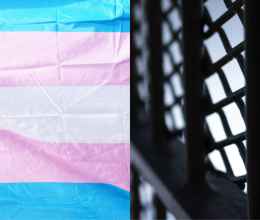The American Civil Liberties Union Foundation of Colorado announced today a settlement agreement in a federal lawsuit it had filed against Colorado Springs School District 11 on behalf of the Palmer High School Gay-Straight Alliance (GSA) in 2003. The school board approved the settlement at its meeting Monday evening.
“This agreement guarantees that the Palmer High School Gay-Straight Alliance will enjoy the same privileges and benefits as all other student clubs,” said Alf McDonnell, of Arnold & Porter, who represented the GSA as an ACLU volunteer attorney. “The students acted in the best American traditions of fairness and respect for their fellow citizens. This is a great day for students’ rights to freedom of expression and freedom of association.”
Student-led and student-initiated gay-straight alliances exist at 50 high schools in Colorado and over 3,000 high schools around the country. Among other activities, they work to reduce anti-gay harassment in schools and facilitate discussion on such subjects as harassment, discrimination, and bias based on sexual orientation between gay students, straight students, and those who are questioning their sexual identity.
The ACLU lawsuit was filed in 2003 after Palmer High School denied recognition to the newly-formed GSA. Without recognition, the lawsuit asserted, the student group could not meet on school property on the same terms as other student groups; could not post club-related information at the school; could not use the public address system to make announcements; and was omitted from the school’s yearbook and official list of student-organized activities.
The lawsuit relied in part on the Equal Access Act, a federal statute that outlaws discrimination against student clubs. The law applies to when schools allow “non-curricular” student organizations, which are clubs that are not directly tied to the subject matter taught in the school’s courses. According to the law, if a school permits even one non-curricular student club to use school facilities, then it must permit all non-curricular clubs. When the lawsuit was filed, Palmer High School recognized a number of non-curricular student clubs, and the ACLU argued that it must therefore recognize the Gay-Straight Alliance.
Soon after the lawsuit was filed, the school board announced a new “two-tier” policy for student clubs The new policy granted full privileges to clubs deemed to be related to the curriculum, but denied many privileges to a new a category of student clubs which were called “Independent Student Groups.”
“Applying this new policy, the school classified the GSA as an “Independent Student Group” and thereby assigned it a second-class status,” said Mark Silverstein, ACLU Legal Director. “Unlike other student clubs, the GSA could not announce its meetings, was forbidden to post announcements on most bulletin boards, and was not allowed to appear in the school yearbook.”
The school contended that this new policy treated all “non-curricular” student clubs equally and therefore did not discriminate illegally against the GSA.
“This new two-tier student club policy was invented and implemented solely because of the GSA and this lawsuit,” Silverstein said. “Unfortunately, almost a dozen other non-curricular clubs, such as a book club, a chess/strategy club, and a mountain biking club, also lost privileges because of this new policy. With this settlement agreement, District 11 has agreed that all student clubs will be treated equally. That is a welcome relief not only to the GSA, but to all other student groups that were treated less favorably under this now-abandoned two-tier policy.”
In addition to McDonnell and Silverstein, Michael Rollin, of Hoffman, Reilly & Pozner, also served as an ACLU cooperating attorney working on behalf of the GSA.

